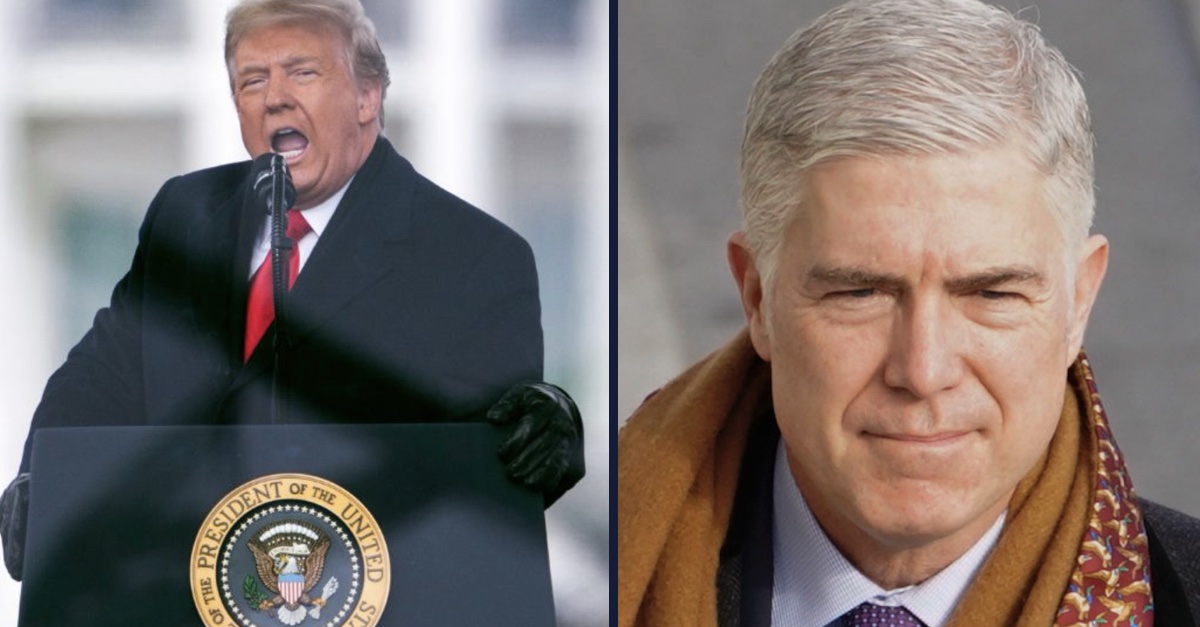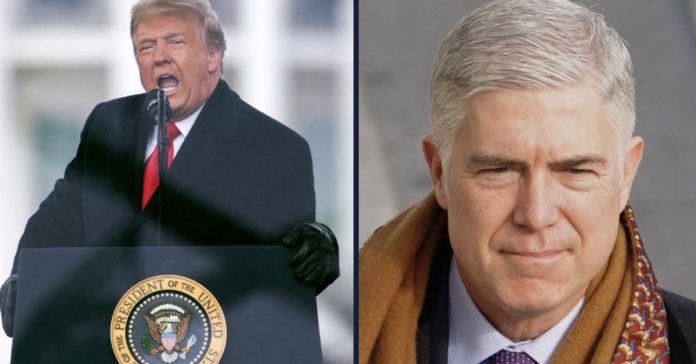
Former President Donald Trump (left) speaks on Jan. 6, 2021. (AP Photo/Evan Vucci, File), (right) Justice Neil Gorsuch arrives at the U.S. Capitol ahead of the inauguration of President Joe Biden on January 20, 2021 (Photo by Melina Mara/POOL/AFP).
The Colorado Supreme Court’s Tuesday 4-3 decision disqualifying former President Donald Trump from being president again, under the insurrection clause of the 14th Amendment, sparked wide-ranging reactions from legal experts who see the U.S. Supreme Court’s involvement as inevitable. For that reason, the state high court’s noticeable namechecking of Neil Gorsuch and the justice’s 2012 decision from when he was a U.S. Circuit judge on the Tenth Circuit also grabbed attention.
The Colorado decision, which is stayed at least until Jan. 4 in the event that the case heads to SCOTUS (as the Trump team reportedly confirmed will happen), concluded that the former president’s “inciting” Jan. 6 speech was not protected by the First Amendment, that he “engaged in insurrection,” that Section 3 of the 14th Amendment is “self-executing” (with no need for Congress to enforce), and that ruling Trump should be removed from the ballot was “not precluded” by the political question doctrine.
In the decision, the Colorado Supreme Court’s slim majority saw fit to reference then-appellate judge Gorsuch’s opinion in Hassan v. Colorado, a case of a naturalized citizen who was constitutionally barred from being on the ballot for the presidency despite Hassan’s claims that such a prohibition ran afoul of the 14th Amendment’s equal protection clause.
In affirming a lower court decision, Gorsuch supported the “state’s legitimate interest in protecting the integrity and practical functioning of the political process permits it to exclude from the ballot candidates who are constitutionally prohibited from assuming office.”
The Colorado Supreme Court majority concluded, therefore, that the state “exercised this power through the Election Code.”
Legal scholars and lawyers, including an attorney for the victorious petitioners, had a lot to say about the foregoing.
A nod to Gorsuch and a Supreme Court state of mind
Attorney Mario Nicolais, who represents the group of registered Republicans and unaffiliated voters in Colorado who sued to remove Trump from the ballot, called the Colorado Supreme Court’s Gorsuch citation as a sign that his clients have a “very good chance” of winning at SCOTUS.
“One of the things that you’ll find in this ruling is some reliance is based on writings of Neil Gorsuch — Justice Gorsuch — and what he had to say about protecting ballots from people who did not belong on them,” he said in comments to CBS. “So I think there’s actually a very good chance we can win at the U.S. Supreme Court level.”
UC Berkeley law professor Orin Kerr, for his part, opined that while the Colorado decision while likely hasten Supreme Court review, the justices will neither care what the state court thinks nor be influenced by it.
In WaPo, @AaronBlake calls the Colorado court’s ruling “momentous” for “political history.” I disagree. The U.S. Supreme Court will decide this, and no Justices care what the Colorado court thinks. This helps make review soon more likely, but it won’t influence the outcome. pic.twitter.com/esEjK0JOix
— Orin Kerr (@OrinKerr) December 20, 2023
In a separate post on X, Kerr said his “tentative thinking” is that former President Donald Trump doesn’t have presidential immunity from his Jan. 6 prosecution but also can’t be blocked by judges from being on the ballot.
This is my take too. More confident on immunity than 14A though. https://t.co/zHkyRaTKoh
— Jonathan H. Adler (@jadler1969) December 20, 2023
“Let both the criminal cases against him and his campaign go forward. Let jurors decide, and let voters vote,” Kerr wrote.
University of Texas law professor Steve Vladeck similarly suggested that “we’d all be better off” if Trump ran for president and lost as opposed to judges barring from Trump running.
I’m going to have more about this in Thursday’s “One First,” but:
1. I think Trump did, in fact, engage in “insurrection”;
2. I think he is an officer for purposes of Section 3; &
3. I think we’d all be better off if he’s on the ballot and loses.
Yes, there’s a tension there.
— Steve Vladeck (@steve_vladeck) December 20, 2023
Vladeck separately appeared to touch on the subject matter of the 2012 Gorsuch decision.
Article II of the Constitution requires the President to be 35 and a “natural-born citizen” who has resided in the United States for at least 14 years.
Those qualifications *also* constrain the right of the people to vote for whomever they please, FWIW.
— Steve Vladeck (@steve_vladeck) December 20, 2023
“Article II of the Constitution requires the President to be 35 and a ‘natural-born citizen’ who has resided in the United States for at least 14 years,” he said. “Those qualifications *also* constrain the right of the people to vote for whomever they please, FWIW.”
Attorney Mark Zaid remarked that while the Colorado decision was a “monumental ruling,” the reality of the situation is “nothing counts until SCOTUS rules.”
Monumental ruling, particularly the adverse factual determinations, but I really wish it had wider margin than 4-3. Reality is nothing counts until SCOTUS rules. If it upholds CO ruling, all bets off as attempts to recreate it across the country occurs. https://t.co/qcs1PYjepz
— Mark S. Zaid (@MarkSZaidEsq) December 20, 2023
“If it upholds CO ruling, all bets off as attempts to recreate it across the country occurs,” Zaid said, referring to numerous other efforts to remove Trump from the ballot in states across the country.
George Washington University law professor and Fox News contributor Jonathan Turley called the Colorado Supreme Court decision “the most anti-democratic opinion in decades.”
“Yet, these justices barred voters from being to vote for their preferred candidate in the name of democracy. It is like burning down a house in the name of fire safety,” he wrote.
The Nation’s Elie Mystal predicted on MSNBC that the U.S. Supreme Court and its conservative majority would be “hypocritical” and overturn the Colorado decision, despite the aforementioned citation of Justice Gorsuch.
WATCH: @ElieNYC on why it was no accident the Colorado Supreme Court directly quoted Justice Neil Gorsuch in their decision to disqualify Trump from the 2024 ballot. pic.twitter.com/Z3GGNPb2pc
— All In with Chris Hayes (@allinwithchris) December 20, 2023
“If Gorsuch had any logical consistency, he would likely uphold the Colorado state court opinion, but what we’re about to see is just how hypocritical and unserious the Supreme Court is when it comes to protecting their partisan sugar daddies, like Donald Trump,” Mystal said.
Conservative lawyer George Conway said on MSNBC that Trump clearly “engaged in an insurrection.”
“We saw it on television. We know what happened. He fomented. He engaged in an insurrection. He wanted this to happen. And not only that, there’s another provision in Section 3 of the Fourteenth Amendment that talks about giving aid and comfort to enemies of the Constitution. Well, he did that. We was an enemy of the Constitution!” Conway said, before offering a prediction of his own. “If this decision gets overturned, it’s not going to be on the basis of the factual findings.”
Like Zaid, CNN legal analyst Elie Honig called the Tuesday decision “historic,” “momentous,” and ticketed for SCOTUS review.
“As the [Colorado] Supreme Court itself says, they are in uncharted territory here, but it’s really important to keep in mind, this is not the last word here. This is almost certainly going up to the U.S. Supreme Court, which can review the decisions of a state supreme court,” Honig said. “In fact, the Colorado Supreme Court anticipates that possibility, and for that reason, they put their own ruling on hold until January 4th, anticipating that it will go up to the Supreme Court.”
“The Supreme Court is going to have the final say. The consequences here are, of course, enormous,” he added later.
Constitutional scholar Frank O. Bowman of the University of Missouri School of Law wrote in a blog post that what stood out to him is that Colorado Supreme Court’s majority “agreed with the finding of the trial court that Trump did indeed ‘engage in insurrection’ as those terms are used in the 14th Amendment” and that “no dissenter disagreed on that point.”
“The three dissents are all about procedure,” Bowman said.
While Bowman agreed that the case “is plainly bound for the US Supreme Court,” his “(sad) prediction is that the Colorado result will be reversed, but that the reversal will not challenge the Colorado holding that Trump engaged in insurrection.”
J. Michael Luttig, a conservative and retired appellate judge of the U.S. Court of Appeals for the Fourth Circuit, called the opinion “unassailable under the objective law of the federal constitution and Section 3 of the 14th Amendment” given his three-year research and study of the issue alongside liberal Harvard Law professor emeritus Laurence Tribe — study that Luttig said took into account “every single argument contrary to every point made by the court today, including all of the contrary evidence to the opinion tonight.”
12.19.23 2035 hrs A must Watch. @CNN ‘s @PamelaBrownCNN w/ Former Judge of the United States Court of Appeals for the Fourth Circuit J Michael Luttig @judgeluttig . Between Judge Luttig and Professor Laurence Tribe @tribelaw came the section 3 of the 14th amendment argument.… pic.twitter.com/qMERElynV7
— Jeff Storobinsky (@jeffstorobinsky) December 20, 2023
“The Supreme Court of the United States ought to affirm this decision today,” Luttig said.
Read the Colorado Supreme Court decision here.
Have a tip we should know? [email protected]

